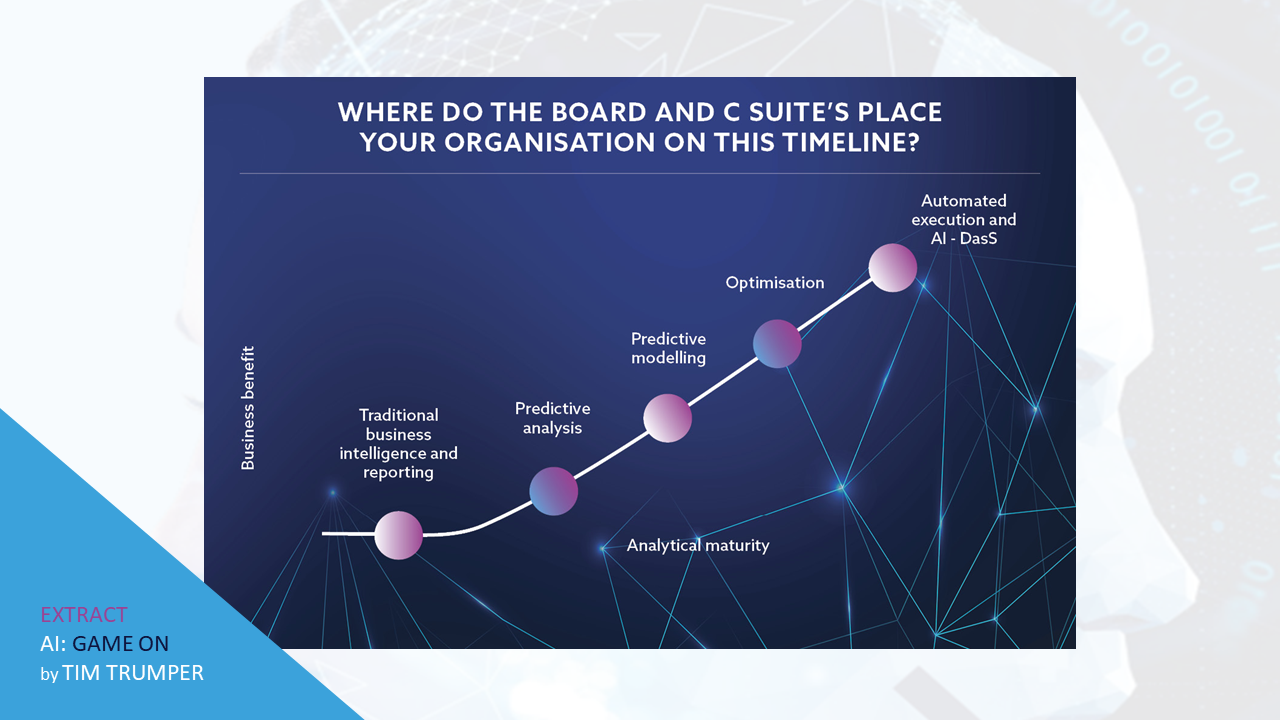A deep dive into the future of AI in business
‘AI won’t take your job. A company whose executives know how to use AI will take your business.’
- Tim Trumper
We recently hosted an enlightening session on AI featuring Tim Trumper, author of AI: Game On.
Tim is Chair of the NRMA and advisor for Quantium, Australia’s largest data and AI enterprise. His career has spanned diverse categories, including artificial intelligence and machine learning, big data, digital transformation, mobility and transport, financial services and media.
He is an authority on how to use information and technology to drive innovation for corporate strategy for a better society. His core interest relates to the role of Directors in creating good governance for the service of customers and the community.
Over dinner on a crisp winter’s evening in Sydney, Tim shared his front-line insights on the transformative power of AI and its implications for business leaders today. He eloquently made the case for why AI is more an opportunity than a threat for most of us.
Tim Trumper & Michelle Playoust in conversation
But first, a quick definition - what is artificial intelligence?
Artificial intelligence, or AI, is a set of technologies that enable computers to perform a variety of advanced functions, including the ability to see, understand and translate spoken and written language, analyse data, make recommendations and more.
Generative AI is a subset of artificial intelligence focused on creating new content such as text, images, and music, based on learned patterns from existing data. ChatGPT is a well-known example of generative AI.
A lesson from Pearl Harbor
To illustrate the value of data, Tim began his presentation with a step back in time to the 1941 Japanese attacks on Pearl Harbor in the USA. Until that moment in the war, the focus of the US military remained primarily on building firepower rather than harnessing data intelligence. Amid growing tensions with Japan, the US military took the seemingly small step of assembling a small team of experts to crack enemy codes.
The tragic events that followed underscored the importance of understanding and interpreting data from outside the organisation. This realisation and those seemingly small steps led to a significant shift in US military strategy, with substantial investments in mathematicians, code breakers and data analysts.
This strategic shift and the successes led by these new intelligence teams marked a clear turning point in the war. Bravo to the data nerds!
Tim noted that every organisation will face its own metaphorical Pearl Harbor – a moment demanding swift, data-driven decision-making – unless it develops real predictive capabilities.
We created this image using the generative AI tool, FLUX.1
‘Data and AI are changing how we think about how we think.’
- Tim Trumper
Data flows have changed the world
Globally, we've seen an accelerating shift in the corporate landscape in recent years, with top companies by market value transitioning from traditional industries to technology and data-driven giants.
This shift highlights the critical role of data and AI in maintaining a competitive edge. Tim explained that data and AI are now primary drivers of economic growth, increasingly replacing labour and capital. Perhaps some of the hype may be real.
Yet he highlighted a significant gap between intention and execution, with only a few organisations outside the tech giants achieving substantive success with AI.
‘It’s pretty clear to me that there’s going to end up being the system that knows everything, and then there’s going to be a supervisory system that limits it.’
- Eric Schmidt, former chair of Alphabet (Google)
The data spine as a competitive advantage
Tim introduced the concept of the ‘data spine’ – the backbone of a modern organisation that links data from the front line to the boardroom. Organisations with a data spine can integrate AI into business processes, enabling better decision-making and resource allocation.
Companies like Amazon, Apple, Uber and Netflix set the benchmark for this integration, moving faster than ever. Tim stressed that organisations with a data spine will soon outpace those without because they can capture signals of customer needs – and thus opportunities. With the right mindset, organisations can translate this data into action and competitive advantage.
While nobody needs to see another strategy firm article telling us how clever these alpha tech-led firms are, for the rest of us in other industries, it would seem wise to adapt and learn.
‘‘Those who have a data spine are going to win and those who don’t are going to get run over.’
- Tim Trumper
What’s the Hippocratic Oath got to do with AI?
And this is where it gets really interesting. Tim discussed the delicate balance between encouraging innovation and managing AI-related risks. He argued that while the risks are real, the opportunities far outweigh the risks if approached correctly.
He urged businesses to focus on opportunities rather than being paralysed by potential threats and discussed the importance of establishing AI guardrails for ethical use.
Tim drew a parallel between AI's ethical challenges now facing governments and the free-wheeling commercial world with how society has abided by the Hippocratic Oath in medicine for centuries. The inference is that we should explore the opportunities presented by AI with the same integrity and care for our communities (‘First, do no harm’) as those in the medical field are compelled to abide by.
There’s a need for deep thought about the long-term consequences of AI deployment, and Tim advocates for a cautious yet proactive approach. As he pointed out, ‘Data that is not ethically and accurately curated is like poison making its way into hamburger mince at scale’.
The guys and girls with the best data win
Clean, comprehensive data is the bedrock of effective AI decision-making. Messy data can hinder AI’s potential, making it crucial for organisations to prioritise data integrity.
Tim provided insights on improving data practices and encouraged leaders to invest in robust data management systems. It might sound like the blatantly obvious, but this investment is vital for harnessing AI's full potential and achieving better decision-making outcomes.
Integrating AI into corporate culture
‘If the CEO doesn’t believe in this, it’s never going to happen’, Tim stated bluntly.
He emphasised the importance of integrating AI into your own corporate culture, starting at the top with the CEO.
AI integration requires a committed leadership team, with leaders actively participating in AI initiatives and leading by visible example. Curiosity will get you a long way.
This point resonated with many in the audience, highlighting that AI integration success depends on top-down support.
In comments from the floor later in the night, several leaders mentioned the difficulty of getting Non-Exec Directors involved and lending their weight to the opportunity side of the AI coin.
‘Understanding customer pain points is your chance to innovate.’
- Tim Trumper
Future-proofing your business
Tim urged business leaders to embrace continuous learning and adaptation to keep pace with AI advancements.
He outlined four key areas where business leaders can leverage AI:
Finding new customers
Predicting the future needs of customers at an individual level (personalisation)
Deploying capital correctly towards future customer needs
Measuring all inputs and outputs to create the optimised organisation that fits with its unique purpose
‘If there is any one secret of success, it lies in the ability to get the other person’s point of view and see things from that person’s angle as well as from your own.’
- Henry Ford
Embrace the AI future
As the session wrapped up, Tim encouraged leaders to explore AI's potential proactively, advocating for its integration across business functions.
His knowledge provided a roadmap for navigating AI’s complexities, making it clear that the future belongs to those willing to innovate and adapt.
Key takeaways
Embrace AI and data: Build a robust data infrastructure to stay competitive.
Leadership is critical: Ensure CEO and executive involvement in AI initiatives.
Focus on opportunities: Balance risk management with proactive opportunity pursuit.
Understand customer pain points: Use AI to drive innovation and improve customer experiences.
Learn more from Tim
We extend our heartfelt thanks to Tim Trumper for his insightful presentation and generous donation of the $5000 speaker fee to the Women’s & Girls’ Emergency Centre (WAGEC).
Elizabeth Wilkins, Chair of WAGEC, was present to accept the donation, adding a meaningful touch to an inspiring evening.
For deeper insights on AI’s role in your business, we recommend getting your hands on Tim’s fantastic book, AI: Game On.
– Mike and the Mozaic Team.



